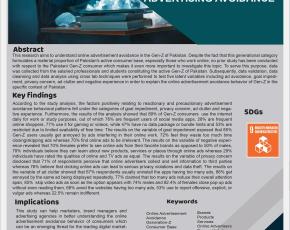Abstract
This research aims to understand online advertisement avoidance in the Gen-Z of Pakistan. Despite the fact that this generational category formulates a material proportion of Pakistan's active consumer base, especially those who work online, no prior study has been conducted with respect to the Pakistani Gen-Z consumer which makes it even more important to investigate this topic. To serve this purpose, data was collected from the salaried professionals and students constituting the active Gen-Z of Pakistan. Subsequently, data validation, data cleansing and data analysis using cross tab techniques were performed to test five latent variables including ad avoidance, goal impediment, privacy concern, ad clutter and negative experience in order to explain the online advertisement avoidance behavior of Gen-Z in the specific context of Pakistan.
Key findings
According to the study analysis, the factors positively relating to reactionary and precautionary advertisement avoidance behavioral patterns fell under the categories of goal impediment, privacy concern, ad clutter and negative experience. Furthermore, the results of the analysis showed that 89% of Gen-Z consumers use the internet daily for work or study purposes, out of which 76% are frequent users of social media apps, 28% are frequent online shoppers, 77% use it for gaming or videos, while 47% have no data package or bundle limits and 53% are restricted due to limited availability of free time. The results on the variable of goal impediment exposed that 85% Gen-Z users usually get annoyed by ads interfering in their online work, 72% feel they waste too much time closing/skipping ads whereas 70% find online ads to be irrelevant. The results on the variable of negative experience revealed that 70% females prefer to see online ads from their favorite brands as opposed to 50% of males, 79% individuals believe they can learn about new products, services or places through online ads whereas 29% individuals have rated the qualities of online and TV ads as equal. The results on the variable of privacy concern disclosed that 71% of respondents perceive that online advertisers collect and sell information to third parties whereas 76% believe that clicking online ads can lead to serious privacy violations and data theft. The results on the variable of ad clutter showed that 67% respondents usually uninstall the apps having too many ads, 86% get annoyed by the same ad being displayed repeatedly, 77% claimed that too many ads reduce their overall attention span, 85% skip video ads as soon as the option appears with 74% males and 82.4% of females close pop-up ads without even reading them, 68% avoid the websites having too many ads, 53% use to report offensive, explicit, or vulgar ads whereas 22.5% remain indifferent.
Implications
This study can help marketers, brand managers and advertising agencies in better understanding the online advertisement avoidance behavior of consumers which can be an emerging threat for the leading digital marketers. Similarly, it suggests how to develop effective promotional strategies that could conveniently engage or attract the potential customer base towards the online business platforms that are the future of digital marketing in the present world of globalization.













